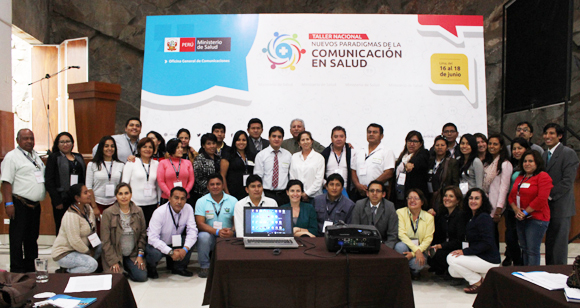
 Lima, June 15, 2016. - The mission, comprised of Cristina Mañá and Vilma Gutierrez, risk and crisis communication experts, arrived in the country from 12 to 16 June to provide technical cooperation in risk communication under the support provided by the Pan American Health Organization in response to the Zika virus.
Lima, June 15, 2016. - The mission, comprised of Cristina Mañá and Vilma Gutierrez, risk and crisis communication experts, arrived in the country from 12 to 16 June to provide technical cooperation in risk communication under the support provided by the Pan American Health Organization in response to the Zika virus.
Lima, June 15, 2016. - The mission, comprised of Cristina Mañá and Vilma Gutierrez, risk and crisis communication experts, arrived in the country from 12 to 16 June to provide technical cooperation in risk communication under the support provided by the Pan American Health Organization in response to the Zika virus.

Both specialists participated as main speakers in two events: "National Health Council: Risk Communication for health actions'' aimed at institutional heads of major institutions that provide advice to the Ministry of Health; and the "New paradigms in health communications Workshop", which brought together communication directors from24 regions of the country.
Vilma Gutierrez said that some of the challenges authorities face when communicating during public health emergencies are uncertainty, helplessness, fear, alarm and confusion. "When we are facing a new disease we are learning and the speed of communication, information gaps and current accessibility can create a lot of rumors and authorities must respond quickly and coherently to these rumors. If we do not, others I will," she said.
In that regard, she affirmed that "when we talk about risk communication it should be clear that we are talking about a comprehensive process of communication activities including planning communication and strategy. This should be implemented through the onset of an emergency and the response, until the post-emergency period when the team should carry out an impact evaluation and identification of lessons learned and best practices."
For Cristina Mañá, the information provided by authorities should minimize speculation and avoid exaggerated interpretation of the data, as well as too safe assessments of public health investigations and control measures. "It is necessary to listen to the population and design messages to clear their doubts and encourage them to take measures that enable them to protect their health," she said.
She advised the health authorities to work on unified messaging content to handle uniformity in messages, as well as to establish a protocol or policy governing the release of public information at this event.
Under the umbrella of risk communication and its pillars of, transparency, early announcement, maintaining trust, listening to the population and planning, both experts agreed that good communication does not replace bad health management, but miscommunication can derail good health management.
Related Links



